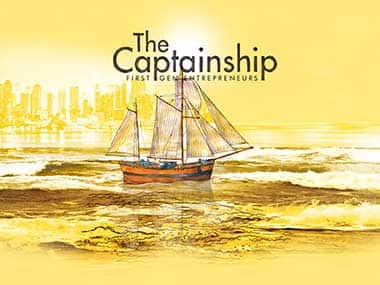Sanjeev Aggarwal (Helion/ Daksh [IBM]), Subroto Bagchi (Mindtree), Girish Batra (NetAmbit), Sanjeev Bhikchandani (Info Edge), Anish Dhawan (ChrysCapital), Ashish Gupta (Helion Ventures / Junglee), Zia Mody (AZB), Satya Narayanan (Career Launcher) and Vijay Shekhar Sharma (One97).
What’s common to these nine individuals?
“Over the years, these kids from middle-class homes become the founders of India’s new economy,” says the introduction to the book that they all feature in: The Captainship - First Gen Entrepreneurs.
There is no background on why the editor, Anya Gupta, selected these nine and not others to represent Captainship (which was inspired, we are informed, by William Ernest Henley’s Invictus: I am the master of my fate: I am the captain of my soul).
So Gupta goes soul-searching, interviewing the chosen nine, beginning each conversation with a question on the entrepreneur’s first memory.
It’s an interesting ‘common ground’, so we’ll dwell here for a bit.
[caption id=“attachment_777443” align=“alignleft” width=“380”]  Book cover of the Captainship.[/caption]
Satya Narayanan’s ‘first’ memory is when he was five or six years old. “We were living is a town called Srikakulam, located in the north-eastern tip of Andhra Pradesh. Appa was posted there as part of the Post and Telegraph Department. I remember holding my older brother’s hand and going to the temple.”
Subroto Bagchi doesn’t tell us how old he was. “My earliest memory of my father is of watching him get ready for work as though work was the most important thing in the world.”
Impact Shorts
More ShortsVijay Shekhar Sharma’s first memory is of his teacher and of a poem he wrote when he was twelve. “My school teacher said my poem was too negative and that people would not understand it.”
Zia Mody’s memory is not so middle class. “I remember my first birthday party. Kids were running around. My father was picking me up and throwing me in the air. My mother was looking beautiful. Salu, my ayah who had been with me from the day I was born, was by my side. They sang the happy birthday song and cut the cake. Mine was an exuberant childhood.”
Back to middle India and the middle class with Sanjeev Aggarwal. “I was born in Nawanshahr in Punjab. I think I was actually a bit of an afterthought. I was the youngest of four children and the age difference between me and my older sister, Deepa, is nine years. She tells me that both she and our elder sister, Manju, started crying when I was born. Their reason was very simple: they already had a big brother who bullied them and now they were worried that they had got another bossy brother.”
Still in middle-ish India. Girish Batra says, “I was born in 1972 in Nagpur, in Maharashtra. I remember living in a large government house next to the Department of Telecommunications (DOT) training centre where my dad was the warden.”
Ashish Dhawan was born in Bombay in 1969. “My father was an accountant at Dunlop Tires, a British company headquartered in Calcutta. Being in finance, you have to be at the head office. Therefore, we moved to Calcutta. At that time, the war with Pakistan, which led to the birth of Bangladesh, was coming to an end,” Dhawan says.
“This was all in a place on the outskirts of Shahranpur, a town, but more of a glorified village, on the border of Uttar Pradesh and Haryana. Shahranpur is known for its sugar mills, and people there are happy growing wheat and ganna,” says Ashish Gupta.
“My dad is a doctor and my mom is a homemaker. They both came over from Sindh, Pakistan, at the time of partition with their respective families,” says Sanjeev Bhikchandani.
That’s the lot; a sampling of the nine introductions. Scratch beneath the surface, and you see some common threads - of parents and grand parents who had difficult times and made it easier for their progeny. Of the importance of education. Of the influences of mothers and a happy childhood (indeed, two call their childhoods ’exuberant’). Of ambition - a number of the subjects have roots in Pakistan and in small towns and villages and strive hard to break the shackles. And, funnily, how government jobs meant security.
The Captainship is not a book you read to learn from. There’s not much to learn. But should all books be about learning? The Captainship is a feel-good read, a book that you can finish in one sitting.
I did.
The Captainship, edited by Anya Gupta, is published by Bloomsbury India, 168 pages, Rs. 299.


)

)
)
)
)
)
)
)
)



